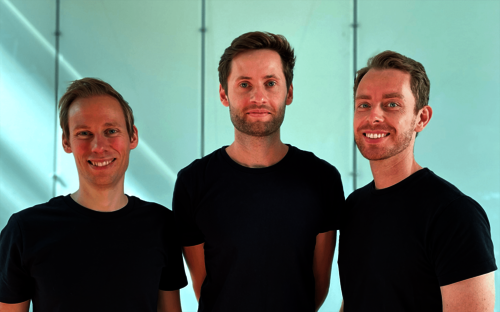Many companies lack know-how when it comes to adapting to a changing climate. They lack an idea of the concrete consequences this can have for their business. This is where the start-up repath from the University of Hamburg comes in: Supported by an EXIST start-up grant, the team led by Julius Pröll and Thomas Remke at the Centre for Earth System Research and Sustainability (CEN) translates the results of climate calculations into risk assessments for international locations and supply chains. Ute Kreis talked to Julius and Thomas about what companies really want to know and the idea for their startup repath.
From scientist to company founder, how did that happen?
Julius Pröll: Before we started our own business, I worked for several years at the Climate Service Center Germany (GERICS). One of the tasks there is to develop ideas and prototypes together with companies and institutions on how to make scientific results usable for them.
Thomas Remke: Such joint pilot projects are super exciting, but also costly. We have found that in the long run, companies tend to look for providers who can support them in solving their very individual climate problems on a permanent basis and in their daily business. We want to fill this gap.
“Know your climate risks” is what your website says. What does that look like in concrete terms?
Julius Pröll: Many companies operate internationally. If climate model calculations predict increased heavy rainfall in a certain region in the coming decades, an expensive new building in the same place may not make much sense. Future climate conditions and corresponding adaptation measures should already be taken into account during the planning phase. This can also be an investment in an alternative location. The situation is similar with supply chains: If you depend on individual suppliers, you have to keep in mind that they can deliver reliably under all circumstances – or position themselves more broadly. That important raw materials may be missing if a water shortage paralyses river shipping or machines break down due to a heat wave and insufficient production can be carried out.
So you offer climate advice?
Julius Pröll: Partly, partly. We work very closely with customers to find out what they want – and need – to know. However, our business model is an IT-based, so-called Climtelligence solution that provides customised information 24 hours a day and in a matter of seconds – even if an advisor is not available at the moment. The core element is a digital platform with which clients can configure and retrieve information packages according to their needs.
Thomas Remke: The fact is that it is not enough to simply put climate data online and the rest will take care of itself. If you want to put climate knowledge to use, you have to offer more.
Our goal is to link physical climate risks with information from other areas: Technical key figures, infrastructure data, regulations and laws, financial data – so that we can make statements about the consequences: How airy must the warehouse be so that higher humidity does not spoil the goods in the future? Where are extreme weather events to be expected that could endanger critical infrastructure such as power lines? Which transport routes will be practicable in the future, and which will be profitable?
For the start-up year, you sought contact with the university and CEN – why?
Thomas Remke: I wrote my Master’s thesis at the Institute of Oceanography with Prof. Johanna Baehr, and later did my doctorate at the Climate Service Center Germany and Leuphana University Lüneburg. But the proximity to the University of Hamburg and CEN remained. So it made sense to reactivate the good contacts. We are very happy to be so close to climate research with the University of Hamburg, the CEN, but also the Cluster of Excellence and the German Climate Computing Centre, and to be able to participate in the infrastructure. Generally, EXIST funding is always handled through a university.
How much courage do you need to take risks and how much entrepreneurial spirit do you have?
Julius Pröll: Being self-employed is challenging, but also a long-standing dream of mine. I’m really happy that all the framework conditions now fit: a great team, a very relevant topic and a solution that really makes sense. It’s also great, of course, that our EXIST scholarship will reduce the financial pressure for a while.
Thomas Remke: I don’t feel particularly brave at all. It’s the right time and the current climate policy situation plays into our cards. People who can provide solutions are desperately needed. Being able to be creative and make a difference is ideal.
The start-up repath consists of Liza Altena (international markets), Sebastian Bartels (product design), Julius Pröll (climate risk assessments) and Thomas Remke (climate modelling).
For more information on the founding story of Repathnow.com, read our Startup Story.
Source: https://www.cen.uni-hamburg.de/about-cen/news/10-news-2021/2021-11-11-exist-stipendium.html








